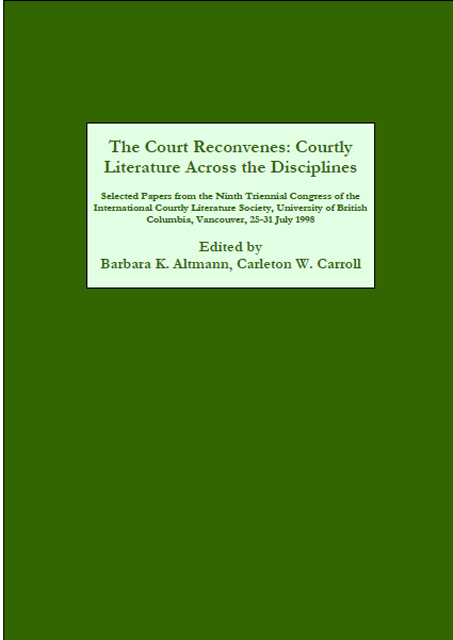 The Court Reconvenes
The Court Reconvenes Questions on the Theme of Incest in Courtly Literature
Published online by Cambridge University Press: 31 March 2023
Summary
The subject of incest, whether in historical or present society, has always received much attention from scholars in the arts and humanities. However, as a taboo of the highest order, the more extreme activities associated with the word “incest” can often obscure a broader understanding of its subtleties and gradations. Aside from fully-consummated sexual acts, there is also a wide range of intra-family relationships which are based upon incestuous tendencies. The interest of this study lies with an examination of incestuous tendencies found in the plots of medieval texts, and further, how to interpret these accounts using modern concepts of incest and the incest taboo.
Despite centuries of fascination with this topic, it has been only since the development of feminist theory that the study of incest has attained a new degree of dynamism. Further, the feminist perspective has been able to achieve new accessibility to this especially sensitive topic in a variety of scholarly disciplines. Even the primary occidental incest myth of Oedipus has been opened to broader interpretation. To further advance the rethinking of incest themes, feminist criticism has proposed revisions to two of the most important theories on incest: Freud's psychoanalytical theory and Lévi-Strauss's anthropological theory.
As an introduction to my examination of the incest motif in courtly literature, it is with this last point that I wish to begin. Some aspects of Freud's and Lévi-Strauss's theories seem to me to contain a high level of plausibility. I also believe they are helpful in clarifying the incest themes found in courtly literature.
Two works by feminist writers have had particular influence on this topic: a paper written in the 70s by anthropologist Gayle Rubin, and Judith Butler's study, Gender Trouble. Rubin's paper is important because of the connection she draws between the ideas of Freud and Lévi-Strauss, and further how she appropriates their concepts for the cause of feminist theory. She interprets these works as the two most advanced theories of female oppression – of course without that being the original intention of the conceiving “fathers.” One of Rubin's central hypotheses states that the concepts of the two theorists interlock with each other nearly perfectly:
Kinship systems require a division of the sexes. The Oedipal phase divides the sexes. Kinship systems include sets of rules governing sexuality.
- Type
- Chapter
- Information
- The Court ReconvenesCourtly Literature across the Disciplines: Selected Papers from the Ninth Triennial Congress of the International Courtly Literature Society, University of British Columbia, Vancouver, 25-31 July 1998, pp. 153 - 160Publisher: Boydell & BrewerPrint publication year: 2002


